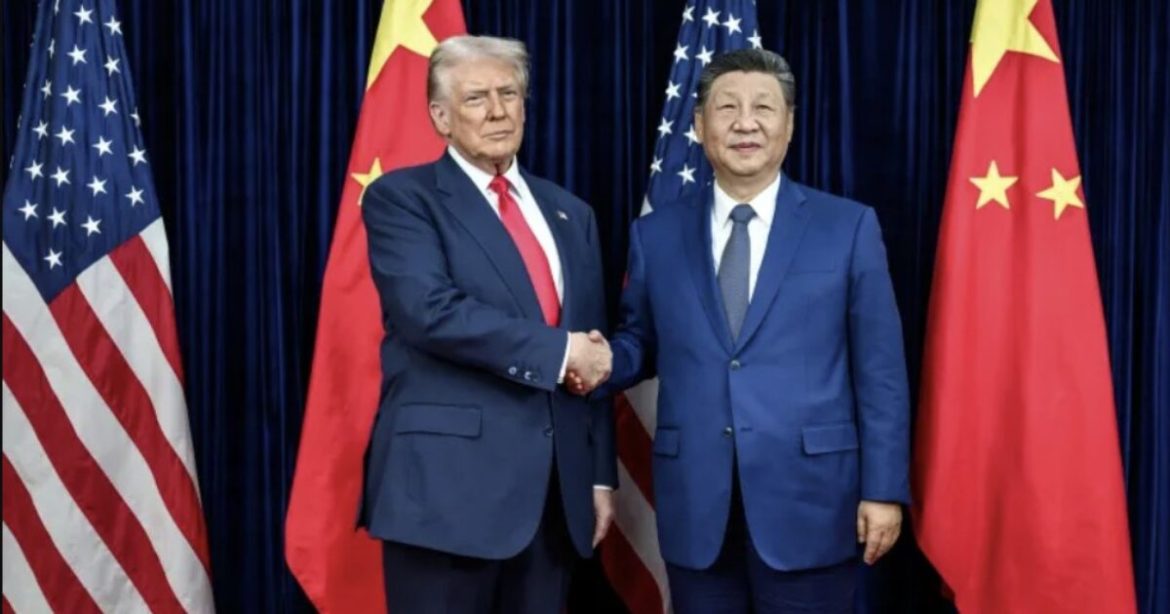

President Trump wrapped up a meeting with Chinese leader Xi Jinping in Busan, which he rated a “12 out of 10.” While both the U.S. and China issued statements describing the summit as productive and positive, it is unlikely to reset the U.S.–China relationship.
Official statements from the two countries show they walked away with differing understandings of the agreements, suggesting the terms were loose and verbal rather than formalized in writing. But even if the terms had been clearly written and signed by both sides, history shows, particularly from the Phase One trade deal during Trump’s first administration, that China rarely keeps its bargains. Apart from discrepancies over the terms and outcomes of this meeting, the two nations still face unresolved issues and conflicting global ambitions.
Chinese state media reported that Chinese Ambassador to the United States Xie Feng called on both nations to “seize the momentum” from the recent presidential meeting in Busan and maintain a steady course in bilateral relations. Speaking at the U.S.–China Business Council’s 2025 conference, Xie said the meeting between Xi Jinping and Donald Trump had “recalibrated” relations at a crucial time, giving hope for renewed cooperation despite ongoing challenges.
He announced several outcomes from the Busan summit and preceding trade talks in Malaysia: the United States will cut fentanyl-related tariffs on Chinese goods from 20% to 10% and suspend additional tariffs for one year, while China will reciprocate. Both sides also agreed to cooperate on anti-drug measures, expand agricultural trade, and address individual business disputes.
Xie stressed that both governments must follow through on their commitments and avoid creating new disruptions. However, it has historically been China, not the U.S., that breaks these agreements.
President Trump said that major decisions were finalized, while China described the talks as yielding “positive results” based on “mutual respect.” The U.S. announced that Trump will visit China in April 2026. Meanwhile, the official statements regarding the details of the summit’s outcome already differ, underscoring how China is diverging from the U.S. understanding of the agreement.
On rare earths, the U.S. said China agreed to suspend multiple export controls dating back to 2022, while China mentioned only the October 2025 restrictions. For agriculture, the U.S. provided specific purchase commitments, 12 million tons of soybeans in 2025 and 25 million annually from 2026 to 2028, whereas China’s statement merely referred to “expanding agricultural trade.” On fentanyl, the U.S. said tariffs on Chinese goods would be halved to 10% in exchange for China restricting certain precursor chemical exports; China mentioned only a general anti-drug agreement.
Regarding tariffs, the U.S. claimed an overall reduction from 57% to 47% and one-year suspensions of certain reciprocal tariffs, while China noted similar but less detailed countermeasure adjustments. In maritime and shipbuilding, both sides agreed to suspend related trade actions for a year. On investment and TikTok, U.S. officials said the TikTok sale would proceed soon, while China said both sides would “properly resolve” the issue.
Differences also appeared in semiconductor, energy, and trade probe discussions: the U.S. cited plans for major energy purchases and continued investigations into China’s earlier trade commitments, points not mentioned in Beijing’s account.
It appears that both sides have interpreted the outcomes differently, suggesting that the two countries will diverge in implementation and later accuse one another of violating the agreement.
Even if China honored every commitment outlined by President Trump, the deeper issue would remain: Beijing’s long-term objective of overtaking the United States militarily, economically, and diplomatically by 2050, and reshaping the international order to serve its own interests. No trade agreement can resolve this fundamental clash between China’s global ambitions and U.S. strategic interests.
At the center of this clash is Taiwan, the single most volatile and consequential issue in U.S.–China relations. Taiwan represents a convergence of irreconcilable interests that could easily escalate into war. The United States opposes China’s reunification of Taiwan by force while simultaneously discouraging Taipei from declaring formal independence. If Beijing were to annex Taiwan against the will of its people, it is likely that the U.S. would intervene militarily.
For China, reunification is a non-negotiable “core interest” tied to regime legitimacy and territorial integrity. Yet Taiwan’s global role makes this far more than a political dispute. Taiwan Semiconductor Manufacturing Company (TSMC) produces 65 percent of the world’s semiconductors and 90 percent of its most advanced chips.
Any conflict in the Taiwan Strait would devastate global supply chains, with U.S. officials estimating a potential $1 trillion hit to the global economy.
At the center of this clash is Taiwan, the single most volatile and consequential issue in U.S.–China relations. Taiwan represents a convergence of irreconcilable interests that could easily escalate into war. The United States opposes China’s reunification of Taiwan by force while simultaneously discouraging Taipei from declaring formal independence. If Beijing were to annex Taiwan against the will of its people, it is likely that the U.S. would intervene militarily.
The same logic extends to regional security. The United States maintains a network of alliances with Japan, South Korea, the Philippines, and Australia, alliances China sees as mechanisms of containment. Beijing, by contrast, envisions a regional order free from U.S. military presence and dominated by its own influence. These are mutually exclusive visions: either the U.S. preserves its forward-deployed alliances, or China achieves its desired regional security architecture. Both outcomes cannot coexist peacefully.
The current trade truce is not transformation. It may ease short-term tensions and slightly boost GDP, but it cannot resolve the underlying rivalry between an established superpower defending the existing world order and a rising authoritarian state intent on reshaping it. The most probable outcome is continued cycles of escalation and détente.
The post Despite Successful Trump–Xi Meeting, U.S.–China Rivalry Remains Irreconcilable appeared first on The Gateway Pundit.

